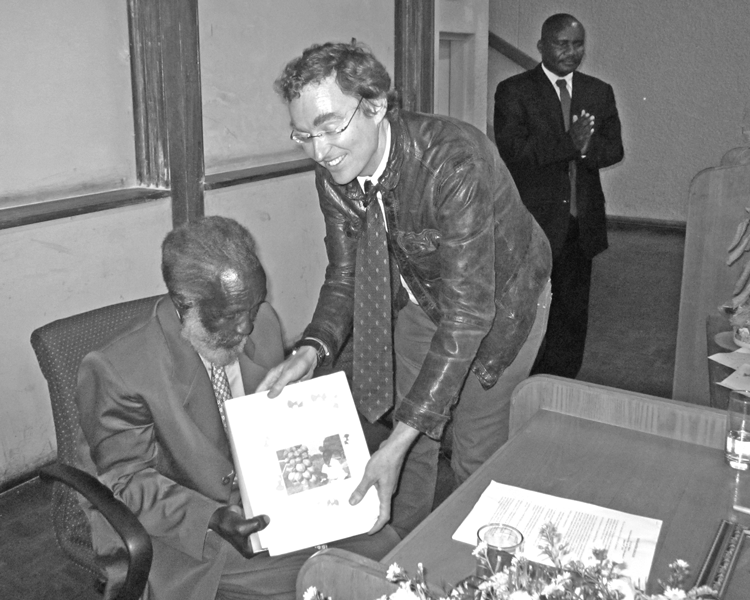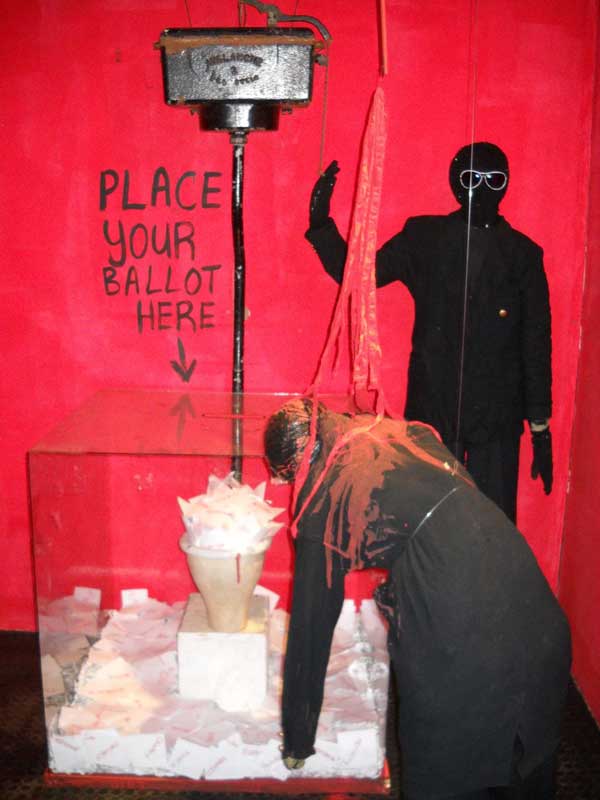A very proud Zimbabwean moment
Friday, September 3rd, 2010 by Bev ClarkLIFE-ACHIEVEMENT AWARD FOR Zepheniah Phiri Maseko. Here’s something from Weaver Press.
University of Zimbabwe, August 24th, 2010:
A full afternoon of shared celebration of the Life Achievement Award of the remarkable Zephaniah Phiri Maseko was spent with a packed lecture hall which included many of the country’s leading researchers, practitioners and advocates for sustainable agriculture and water conservation. Messages of congratulations were received from all over the world, including from the Executive Director of the United Nations Environment Program, The Charles Darwin Foundation, and many international specialists in water harvesting and sustainable agriculture. Dr. B.B. Mukamuri of the Centre of Applied Social Sciences presided over the event, in which Mr. Phiri was presented with a several hundred page Book of Life by long-standing friend and colleague Dr. K.B. Wilson that included all the materials that have been published on his work over the years.
(This book will shortly be available for free download on the Weaver Press site <www.weaverpresszimbabwe.com>)
During the afternoon Mr. Phiri’s forty years of research in agricultural and water harvesting was presented along with the comments and reactions of the 8,000 visitors that he has received from more than 30 countries in his many years of service.
Mr. Phiri reminded the audience of how hardship in the struggle for independence that had propelled him to seek self-reliance through agriculture, and that the causes of innovation – great suffering and biblical inspiration in his case – are often surprising. In a moving and often humorous speech he called upon Zimbabweans to care for their land and their future. That God had said to Adam “Here is the land. Use it and keep it.”
Ms. Irene Dube, who has been the Director of Zvishavane Water Project for the last ten years vividly described the success of this indigenous NGO founded by Mr. Phiri almost twenty-five years ago. Thousands of farmers and communities have benefited not only in Zvishavane District but also in Chivi and Mberengwa, and that his water harvesting approach is spreading. Local farmers from Chimanimani, Mutoko and Zvishavane Districts then stunned the audience by accounts of how many farmers are taking up Mr. Phiri’s approach – more than a thousand in Chikukwa alone according to Mr. Scorpion a dynamic young farmer from the area. Mr. Cleopas Banda from the natural region five region of Mazvihwa had brought with him dozens of crops and food samples to demonstrate that he is able to grow crops more typically associated with natural regions one and two on his arid land, such as bulgar wheat, and that his work had healed major gulleys in Gudo. Mr. Abraham Mawere who worked with Mr. Phiri in applied research back in the 1980s emphasized Mr. Phiri’s ability to listen to people and the land.
Mr. John Wilson, well known local specialist in sustainable agriculture proposed that an annual award for innovations in sustainable agriculture be created in Mr. Phiri’s name and awarded by an appropriate institution. This idea was seconded by Mr. Ezekiel Makunike, a long time advocate of Mr. Phiri’s work, and a call was made for suggestions as to the way forward.
Representing the Zvishavane District Government, Mr Shirichena, the chief AREX officer said that “Mr Phiri’s work had put Zvishavane on the world map” and that all were proud of their renowned local citizen. He also commented that “the AREX of today was not the Agritex of colonial times which had arrested Mr Phiri. AREX in Zvishavane now encouraged responsible wetland farming because Mr Phiri had proven it productive and effective.”
In his closing remarks Professor Mafongoya of University of Zimbabwe’s Agricultural Department responded to the presentation of Mr. Phiri’s innovations and the calls from all assembled that he be appropriately honored with an honorary doctorate by indicating that he would pursue the matter with the university through the appropriate channels.











